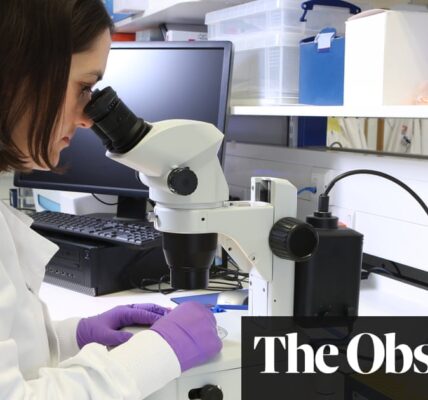A study suggests that in rare medical accidents, Alzheimer’s disease can be transmitted between humans.

Current research indicates that Alzheimer’s disease can potentially be transmitted between individuals in uncommon medical mishaps. However, experts emphasize that there is no proof that the condition can be transferred through regular daily interactions or standard care practices.
Experts report that a small number of individuals who were given human growth hormone extracted from the pituitary glands of deceased donors have experienced the onset of Alzheimer’s at a young age. This is likely due to the presence of contaminated proteins in the hormone, which initiated the development of the disease in their brains.
The study’s co-author, Prof John Collinge, clarified that Alzheimer’s disease cannot be caught like a virus or bacterial infection. It is not transmissible.
“Inoculation with human tissue or extracts containing these seeds typically only occurs accidentally, which is fortunately a rare and uncommon situation.”
The team suggests that the new research supports the notion that Alzheimer’s disease shares similarities with prion diseases, particularly in the way that the proteins responsible for the disease spread throughout the brain.
Prion diseases, which include Creutzfeldt-Jakob disease (CJD), kuru and BSE, are caused by infectious, misfolding proteins which propagate in the brain. These diseases typically occur spontaneously, however more rarely they can arise from a genetic mutation, or be transmitted via infected brain or nervous tissue.
In a publication in the scientific journal Nature Medicine, Collinge and his team document that from 1959 to 1985, a minimum of 1,848 individuals in the UK were administered human growth hormone taken from the pituitary glands of deceased donors.
Unfortunately, the practice was prohibited in 1985 due to reports of patients dying from CJD after being exposed to hormone samples contaminated with proteins that cause the disease.
Out of the 80 instances in the UK, a few were also discovered to have a protein known as amyloid-beta in their brains upon death – a characteristic sign of Alzheimer’s disease. It is uncertain if these individuals would have eventually experienced symptoms of Alzheimer’s, but other studies revealed that amyloid-beta was present in certain batches of hormones and that administering them to mice resulted in a disease similar to Alzheimer’s.
The findings of the researchers were based on all eight individuals who were sent to the National Prion Clinic from 2017 to 2022.
All individuals were given human growth hormone obtained from corpses, yet none developed CJD. Five displayed signs of dementia that met the clinical criteria for Alzheimer’s disease, with symptoms appearing as early as 38 years of age. Of these five patients, three had brain scans that confirmed the diagnosis, while two had biomarkers that met the criteria for Alzheimer’s.
Out of the remaining three patients, one displayed slight cognitive impairment, one reported experiencing cognitive difficulties, and one did not exhibit any symptoms. The first patient’s postmortem analysis was in line with a diagnosis of Alzheimer’s, while the third patient met the biomarker criteria for the disease.
Out of five patients, only one had DNA information that indicated a risk for developing late onset Alzheimer’s. None of the patients had genetic variations that are typically associated with early onset Alzheimer’s.
The scientists observed that the patients displayed certain symptoms that were not commonly seen in cases of Alzheimer’s disease, which can either occur on its own or be associated with genetic susceptibility. They propose that this could be due to the disease having a distinct cause, or being caused by various forms of amyloid-beta.
According to the findings, there is proof that Alzheimer’s can develop due to receiving contaminated pituitary hormone treatment.
Collinge and his team discovered that the cases involved prolonged exposure to infected human growth hormone over several years. Their research highlights the significance of taking measures, such as properly sterilizing surgical tools, to prevent contamination.
According to Andrew Doig, a biochemistry professor at the University of Manchester, professionals are already extremely cautious when it comes to transferring brain tissue between individuals.
Doig also warned that the study only included eight patients, and some of them did not have genetic information. Additionally, there is currently no direct proof for distinct strains of amyloid-beta.
“Although this newly discovered type of Alzheimer’s is significant in terms of scientific discovery, as it uncovers a previously unknown method of disease transmission, there is no need for concern. The cause of the disease was effectively halted over 40 years ago,” stated Doig. “The transfer of the disease from one human brain to another should not occur again in this manner.”
Source: theguardian.com


